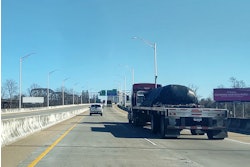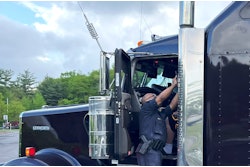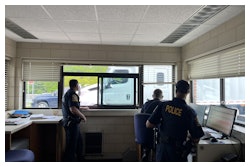Following U.S. Transportation Secretary Sean Duffy’s announcement Tuesday that the DOT is officially rescinding the Obama-era guidance that relaxed enforcement of English language proficiency (ELP) regulations for truck drivers, the Federal Motor Carrier Safety Administration circulated an Internal Agency Enforcement Policy offering new guidance on how inspectors should enforce the regulations.
Portions of the new policy are redacted under a Freedom of Information Act exemption that allows agencies to withhold information that "would disclose techniques and procedures for law enforcement investigations or prosecutions, or would disclose guidelines for law enforcement investigations or prosecutions if such disclosure could reasonably be expected to risk circumvention of the law." (Readers can download the partially redacted enforcement policy document via the button at the bottom of this story.)
[Related: English language proficiency crackdown already? Here's what states are saying]
The policy advises FMCSA personnel to initiate all roadside inspections in English. If the inspector’s initial contact with the driver indicates that the driver may not understand the initial instructions, the inspector should conduct an ELP assessment to evaluate the driver’s compliance with 49 CFR § 391.11(b)(2). That assessment, according to FMCSA, should consist of a driver interview and a highway traffic sign recognition assessment.
During the driver interview portion of the evaluation, the guidance tells inspectors they “should evaluate the driver’s ability to respond sufficiently to official inquiries and directions in English,” as required by the regulation. Inspectors are also instructed to inform the driver that he or she should respond to the inspector in English.
FMCSA clarifies that tools to facilitate communication -- interpreters, I-Speak cards, cue cards, smart phone applications, and On-Call Telephone Interpretation Service -- should not be used during the driver interview, as those tools may mask a driver’s inability to communicate in English.
If the inspector determines the driver is unable to respond to official inquiries in English sufficiently, it is the policy of FMCSA that the inspector cite the driver for a violation of 49 CFR § 391.11(b)(2). If cited, there is no need to proceed to the traffic sign recognition assessment.
During the traffic sign portion of the evaluation, inspectors are instructed to conduct the assessment to include highway traffic signs that conform to the Federal Highway Administration’s "Manual on Uniform Traffic Control Devices for Streets and Highways" (MUTCD) and electronic-display changeable, or dynamic, message signs the driver may encounter while operating a commercial motor vehicle.
When performing inspections of drivers operating CMVs in the border commercial zones along the U.S.-Mexico border, FMCSA enforcement personnel are directed to cite drivers for violations of 49 CFR § 391.11(b)(2) in accordance with the new policy, “but should not take follow-on actions of placing the driver out-of-service or initiating an action to disqualify the driver.”
FMCSA’s new policy is effective immediately. The agency directed all federal inspectors to begin implementing the policy “and take all necessary actions to initiate the driver disqualification process should a driver be deemed unqualified” under the regulation.
Once the Commercial Vehicle Safety Alliance incorporates the policy shift into its North American Standard Out-of-Service criteria on June 25, FMCSA said the policy will “provide uniform enforcement by Federal and State inspectors.”
Download the enforcement policy below.









